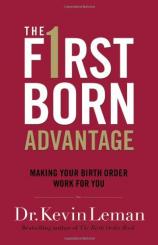The Firstborn Advantage: Making Your Birth Order Work for You
Review
The Firstborn Advantage: Making Your Birth Order Work for You
What’s your birth order? Were you a firstborn, middle child or the baby of the family? Were you an only child? No matter what your birth order, odds are that it’s affecting you more than you realize. In THE FIRSTBORN ADVANTAGE, bestselling author Dr. Kevin Leman helps firstborns make the very most of their birth order. Here’s the fascinating twist in Leman’s assessment: birth order not only deals with the ordinal position of a child but also his or her functional birth position. This means that even if you aren’t the oldest in a family, you still may have firstborn tendencies that affect your outlook and approach to life.
Leman points to a variety of variables that play into birth order. For example, if you’re from a large family, it’s not just the oldest who is a firstborn; there are others with firstborn tendencies. The reasoning is that in a large family of six or eight or more children, the family divides down into subunits. So among the three or four youngest children, one may assume the role as the oldest.
In addition, gender can play a role in firstborn tendencies. Leman writes: “You don’t have to be a rocket scientist to realize that if there are four boys and one girl in your family, there’s something unique about one of your kids.” He points out that both the oldest male and female could have firstborn traits. An age gap of five or more years can also create firstborn traits in a non-firstborn. Other factors that can influence these traits are blended families and significant mental or physical differences among children.
Why is this so important? Because even if you’re not a firstborn, you may have firstborn traits. If so, this book is for you! In an easy-to-read manner, Leman takes a good look at the firstborn personality. He notes that firstborns are natural achievers, task-oriented and ready to get things done. But all that drivenness can have a downside as it affects a firstborn’s ability to build and maintain healthy relationships. Another struggle is criticism and becoming a flaw picker. Leman offers practical tips and advice on how to turn these weaknesses into strengths. In addition, he encourages firstborns to use their natural abilities in school and at work to their advantage.
One of the best features of the book is that Leman writes as if he’s really for --- not against --- the firstborns. He writes with a hope and enthusiasm for firstborns and gives them practical tools on how to get the most out of life. Throughout, he draws on insights from the First Born Girls Social Club and its founder, Laura Carter, as well as stories of firstborns.
Overall, this is a great resource for anyone interested in how birth order affects their friends, family or workplace. Though you may not be a firstborn birth, you may be one by the function in your family, which makes THE FIRSTBORN ADVANTAGE a valuable resource for readers of all ages and birth orders.
Reviewed by Margaret Oines on September 1, 2008





